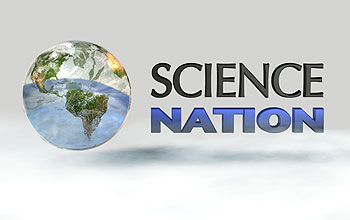News Release 09-116
National Science Foundation Releases Science Nation, a Video Series on Breakthroughs and Discoveries That Impact Our Lives
Series created for NSF by former CNN senior science producers

NSF's Science Nation video series will examine breakthroughs and possibilities for new discoveries.
June 1, 2009
This material is available primarily for archival purposes. Telephone numbers or other contact information may be out of date; please see current contact information at media contacts.
The National Science Foundation (NSF) today released the first in a series of video programs called Science Nation, which examine breakthroughs and the possibilities for new discoveries about our planet, our universe and ourselves. The video series is being created for NSF by former senior science producers at CNN, including Peter Dykstra and Kate Tobin. Each program features a two-minute and five-minute version.
"We are pleased to be able to educate and engage the American public about the diverse range of NSF-funded cutting-edge research that is going on every day," said Jeff Nesbit, director of NSF's Office of Legislative and Public Affairs. "Each week, Science Nation will take a dynamic, entertaining look at the research, and the researchers, that will change our lives."
The first episode, released on June 1, focuses on what we can learn from organisms that can live and thrive in frozen deserts or steaming-hot volcanic vents. These "freak" organisms may offer clues about possible life away from Earth. Subsequent episodes will be released every Monday and will be featured on http://www.nsf.gov/news/special_reports/science_nation/index.jsp. The videos can be downloaded from that site. Links to the videos can also be embedded on other sites.
Upcoming shows include:
- Tornadoes: research into perfecting how to anticipate tornadoes, and save lives in the process
- Artificial Retina: a totally-blind woman whose sight is partially restored through what is essentially a bionic eye
- Hydrogen Cars: advances in someday finding the "Holy Grail" of hydrogen-powered vehicles
- Cleaning up Rural China: coal-based cookstoves rule in rural China--an American grad student has potential solutions
- Greenland Ice Cores: research into ages-old ice cores from Greenland could preview what climate change may mean for us
In addition, the producers are developing programs about Emperor penguins, biofuels and atom-thin nanofibers.
-NSF-
Media Contacts
Dana Topousis, National Science Foundation, (703) 292-7750, email: dtopousi@nsf.gov
Related Websites
Science Nation: http://www.nsf.gov/news/special_reports/science_nation/index.jsp
The U.S. National Science Foundation propels the nation forward by advancing fundamental research in all fields of science and engineering. NSF supports research and people by providing facilities, instruments and funding to support their ingenuity and sustain the U.S. as a global leader in research and innovation. With a fiscal year 2023 budget of $9.5 billion, NSF funds reach all 50 states through grants to nearly 2,000 colleges, universities and institutions. Each year, NSF receives more than 40,000 competitive proposals and makes about 11,000 new awards. Those awards include support for cooperative research with industry, Arctic and Antarctic research and operations, and U.S. participation in international scientific efforts.
Connect with us online
NSF website: nsf.gov
NSF News: nsf.gov/news
For News Media: nsf.gov/news/newsroom
Statistics: nsf.gov/statistics/
Awards database: nsf.gov/awardsearch/
Follow us on social
Twitter: twitter.com/NSF
Facebook: facebook.com/US.NSF
Instagram: instagram.com/nsfgov


